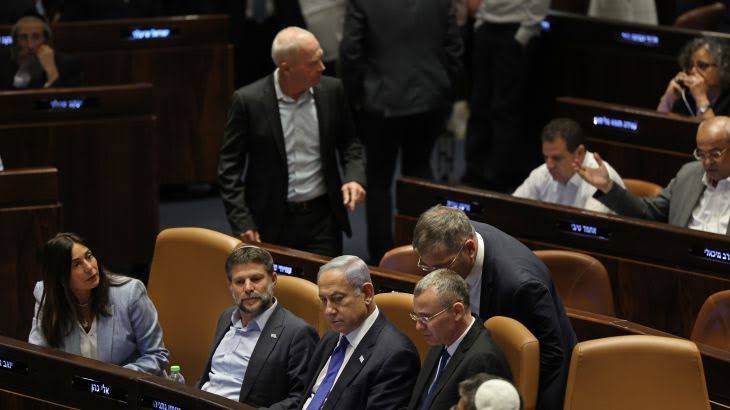
Amidst a constitutional crisis that has gripped the nation for months, Israel’s parliament approved the first bill of a judicial overhaul, a central pursuit of Prime Minister Benjamin Netanyahu. The bill seeks to curtail the powers of the Supreme Court to overturn government decisions deemed “unreasonable.” The legislation received overwhelming support with a 64-to-0 vote, but not without sparking protests as opposition lawmakers expressed their dissent.
The day of the vote witnessed intense demonstrations, which began early with protesters chaining themselves to posts and blocking roads outside the parliament. As the hours passed, the number of demonstrators swelled, leading to thousands taking to the streets across the country, clashing with law enforcement and causing highway blockades. In response to the protests, Israeli police made 19 arrests.
Undeterred by the mounting opposition, the government stood firm in its determination to implement the judicial changes. Justice Minister Yariv Levin, a leading advocate of the legislative package, stressed the importance of achieving a balanced distribution of power among the branches of government. Prime Minister Benjamin Netanyahu framed the amendments as a crucial measure to counter what he perceives as the Supreme Court’s excessive political involvement.
The amendment is just one part of a larger overhaul proposed by the government in January, shortly after taking office. The government’s rationale for these reforms is to address what they view as an overreach by the Supreme Court, which they argue has become too involved in political matters.
However, critics are concerned that the changes will pave the way for potential abuses of power, as they may remove vital checks on the executive branch’s authority. The proposed reforms have already sparked months of unprecedented nationwide protests and raised international apprehensions about the state of Israel’s democratic values.
Almost immediately after the vote, a political watchdog group and the centrist opposition leader declared their intent to challenge the law in the Supreme Court. The mounting pressure on the government prompted Netanyahu to express a willingness to engage in dialogue with the opposition in search of a comprehensive agreement by the end of November. He emphasized the shared commitment to upholding Israel’s democratic principles, individual rights, and the independence of the courts.
The political crisis has not only polarized Israeli society but has also begun to impact the military. Protest leaders warned that thousands of volunteer reservists would refuse to report for duty if the government continued with its plans. Additionally, former high-ranking military officials cautioned that the country’s preparedness for war could be jeopardized.
Protesters took their grievances to Jerusalem, where they blocked a highway near the parliament building. Police intervened, using force to disperse the crowds, leading to clashes. In Tel Aviv, mounted police were deployed to disperse protesters who had blocked the main highway, leading to tense confrontations and small fires being lit by demonstrators.
The international community, including the White House, has urged Israel’s leaders to pursue dialogue and seek broad consensus on the matter through political means. The economic impact of the vote was evident, with Tel Aviv’s main share indices dropping up to 2.5% and the shekel losing value against the dollar.
Opposition leaders vowed to challenge the legislative changes, and the head of the Histadrut labour federation even threatened a general strike if the government resorted to unilateral actions.
The future of Israel’s judiciary and political landscape now stands at a crossroads, prompting both citizens and leaders to contemplate the path ahead after this significant constitutional upheaval. As the government and opposition engage in a spirited dialogue over the scope of the Supreme Court’s powers, the nation remains in a state of anticipation and reflection, aware of the profound implications for its cherished democratic system.













